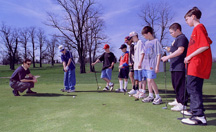 Purdue News
Purdue News
 Purdue News
Purdue News
April 1997

|
"We need to make physical activity fun and focus on what we can do for kids to see that they stay active throughout their lives," she says. Tappe, an associate professor of health, wrote the report as part of an intergovernmental personnel agreement between Purdue and the CDC.
The report, Guidelines for School and Community Programs to Promote Lifelong Physical Activity Among Young People, notes that mandatory physical education on a daily basis goes against the current trend in schools. For example, daily enrollment in high-school physical education classes decreased from 42 percent of students in 1991 to 25 percent in 1995.
The report also points out that although American young people are more active than adults, physical activity sharply declines with age among children and adolescents. Nearly half of this country's youths aged 12 to 21 are not vigorously active on a regular basis.
According to the guidelines, schools should eliminate or sharply reduce the practice of granting exemptions from physical activity, and they should increase the amount of time during class that students are active.
The report also states that safe facilities for physical activity should be made available to students both during and after school. "If schools lack the personnel to offer after-school activities, they could team up with community organizations to see that extracurricular physical activities are available to as many children as possible," Tappe suggests.
She says schools also can help enhance the quality and image of "P.E." classes. "Teachers should never use running or doing push-ups as forms of punishment. And grades for physical education classes should not be too tied to students' athletic ability," she says.
"Too many times we think negatively toward physical education classes with their emphasis on competitive sports. Competition is not for all kids, but physical activity is good for virtually everyone."
Removing the stigma tied to physical education is part of the goal of educators like Michael Savage, who taught physical education at elementary schools before becoming an assistant professor of health, kinesiology and leisure studies at Purdue. "We are moving away from the days when physical education teachers were also coaches," he says.
"My idea of a good P.E. class is one where youth are involved in at least 20 minutes of basic movement that gets their heart rates up. They should also be taught motor and behavioral skills that emphasize participation and enjoyment in physical activity.
"Unfortunately, we have to justify physical education more than any other subject taught in schools, perhaps because many parents had bad experiences themselves."
Physical education classes have been one of the targets of school administrators trying to cut spending. Tappe says an increased emphasis on physical education should be an important part of education reform.
"Educators know that kids need healthy bodies in order to learn properly. Physical activity is an important factor in physical and mental health," she says. "We need to promote physical education from the standpoint of its health benefits and its effect on the development of motor and behavioral skills."
Sources: Marlene Tappe, (765) 494-9112; e-mail, mtappe@purdue.edu
Michael Savage, (765) 494-0216; e-mail, msavage@purdue.edu
Writer: Beth Forbes, (765) 494-9723; e-mail, beth_forbes@purdue.edu
Purdue News Service: (765) 494-2096; e-mail, purduenews@purdue.edu
Photo Caption
Color photo, electronic transmission, and Web and ftp download available. Photo ID:
Tappe/Phys ed
Download here.